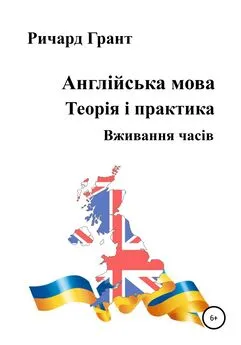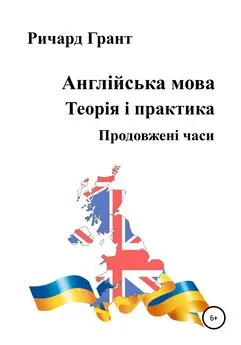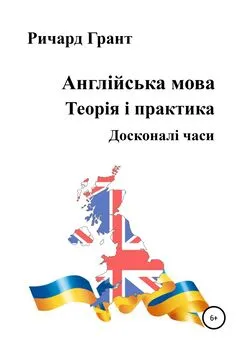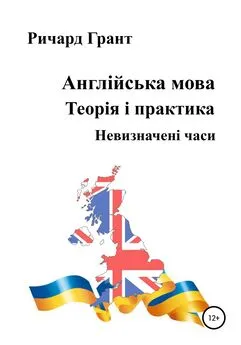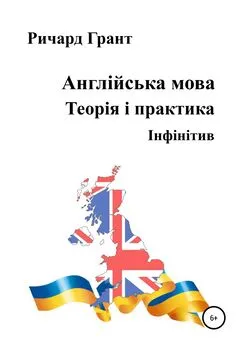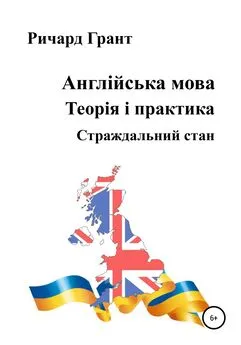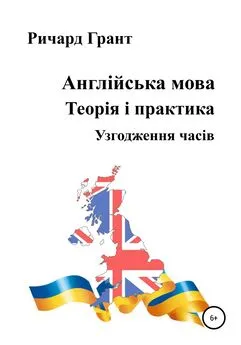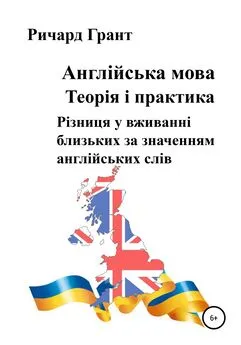Ричард Грант - Англійська мова. Теорія і практика. Вживання часів
- Название:Англійська мова. Теорія і практика. Вживання часів
- Автор:
- Жанр:
- Издательство:неизвестно
- Год:2021
- ISBN:978-5-532-94578-4
- Рейтинг:
- Избранное:Добавить в избранное
-
Отзывы:
-
Ваша оценка:
Ричард Грант - Англійська мова. Теорія і практика. Вживання часів краткое содержание
Освоївши теоретичний матеріал, представлений в цій серії і виконавши більше 600 вправ для самоконтролю, Ваш словниковий запас складатиметься з більше, ніж 6 000 англійських слів і виразів, що дозволить Вам успішно скласти такі міжнародні іспити по англійській мові, як TOEFL(Test of English as a Foreign Language), IELTS(International English Language Testing System) і інші.
Англійська мова. Теорія і практика. Вживання часів - читать онлайн бесплатно ознакомительный отрывок
Интервал:
Закладка:
I have been washing the car. I need to take a shower. – Я мив машину. Мені потрібно прийняти душ.
Present Continuous – дія відбувається зараз.
She is playing volleyball. Look – she is wearing black shorts and a white T-shirt. – Вона грає у волейбол. Подивися – на ній чорні шорти і біла футболка.
I am washing the car. Then I’ll have a shower. – Я мию машину. Потім я прийму душ.
Рiзниця мiж The Present Perfect Continuous i The Present Perfect
Present Perfect Continuous – акцент на тривалості дії. Неважливо, закінчилася дія чи ні.
I have been cleaning the kitchen all morning. I am very tired. – Я прибирала кухню весь ранок. Я дуже втомилася.
Mary is very studious. She has been doing homework all evening. – Мері дуже старанна. Вона робить домашнє завдання весь вечір.
Present Perfect – акцент на результаті дії. Дія виконана.
I have cleaned the kitchen. It is as good as new now. – Я прибрала кухню. Тепер вона як новенька.
She can go out because she has done her homework. – Вона може йти гуляти, бо зробила домашнє завдання.
Present Perfect Continuous – дія все ще триває або тільки що закінчилася. Можна задати питання how long? (як довго?) .
I have been watching the last season of “Game of Thrones” since yesterday. – Я дивлюся останній сезон "Гри престолів" з учорашнього дня.
They have been hitchhiking for seven years. – Вони подорожують автостопом вже сім років.
Present Perfect – дію завершено. Можна задати питання how much? (скільки?) , how many times? (скільки разів?) , how often? (як часто?) .
I have watched the last episode of “Game of Thrones” three times. – Я подивився останню серію "Гри престолів" три рази.
I have never hitchhiked in my life. – Я ніколи в житті не подорожував автостопом.
Рiзниця мiж The Present Perfect Continuous i The Past Continuous
Present Perfect Continuous – дія почалася в минулому і або все ще триває, або у неї є результат в сьогоденні.
What have you been doing all day today? – I have been working on a presentation for our next meeting. – Чим ти займався весь день сьогодні? – Я працював над презентацією для нашого наступного зібрання.
Past Continuous – дія відбувалася в певний момент в минулому.
What were you doing at 9 p.m. yesterday? – I was working on a presentation for our next meeting. – Що ти робив вчора о 9 годині вечора? – Я працював над презентацією для нашого наступного зібрання.
Рiзниця мiж The Future Perfect Continuous i The Future Perfect Simple
Future Perfect Continuous i Future Perfect Simple схожі, а іноді можуть бути взаємозамінними. Наприклад, у випадку з дієсловами, які не використовуються з часами Continuous: know, understand та іншими. Однак є між ними одна важлива відмінність – для Future Perfect Continuous важливо підкреслити тривалість дії, а Future Perfect Simple робить акцент на завершеності дії і її результаті.
By the end of the day I will have been reading for eight hours. – К кінцю дня я буду читати протягом восьми годин. – Future Perfect Continuous
By the end of the day I will have read 500 pages of the book. – К кінцю дня я прочитаю 500 сторінок книги. – Future Perfect Simple
I will have been working on this project for six months by the end of this year. – К кінцю року я буду працювати над цим проектом вже протягом шести місяців. – Future Perfect Continuous
I will have finished working on this project by the end of this year. – К кінцю року я закінчу працювати над цим проектом. – Future Perfect Simple
Запам'ятайте:
У додаткових реченнях часу і умови після сполучникiв if, when, as soon as, before, till/until, after замість майбутнього часу вживається теперішній час.
Вправа 41
Розкрийте дужки, вживаючи дієслова у Present Continuous, Present Simple або Future Simple.
1. I ( to play) chess tomorrow. 2. It ( to be) cold in autumn. It often ( to rain). A cold wind often ( to blow). 3. You ( to come) to my place next Sunday? 4. My sister ( not to like) coffee. 5. I ( not to play) chess tomorrow. 6. The weather ( to be) fine today. It ( to be) warm, the sun ( to shine) brightly. A soft wind ( to blow). Small white clouds ( to sail) in the sky. 7. You ( to read) this book next week? 8. When you ( to go) to bed every day? 9. You ( to play) chess tomorrow? 10. Don’t go out: it ( to rain) heavily. 11. You ( to read) books every day? 12. What he ( to read) now? 13. He ( to play) chess every day. 14. Take your raincoat with you. I am afraid it ( to rain) in the evening and you ( to get) wet through if you ( not to put) it on.
Вправа 42
Розкрийте дужки, вживаючи дієслова у Present Continuous, Present Simple або Future Simple.
1. You ( to read) a book now? 2. What he ( to read) every day? 3. He ( not to play) chess every day. 4. Every spring birds ( to come) to our garden and ( to sing) in the trees. 5. I ( not to see) him tomorrow. 6. What he ( to read) tomorrow? 7. He ( to play) chess every day? 8. Listen! Somebody ( to sing) in the next room. 9. What you ( to do) tomorrow? 10. You ( to give) me this book tomorrow? 11. They ( to play) chess now. 12. It usually ( not to snow) at this time of the year. 13. What your friend ( to do) tomorrow? 14. Where she ( to be) tomorrow?
Вправа 43
Розкрийте дужки, вживаючи дієслова у Present Continuous, Present Simple або Future Simple.
1. They ( not to play) chess now. 2. What the weather ( to be) like now? It ( to snow)? – No, it … . 3. Where you ( to go) next summer? 4. Where she ( to go) tomorrow? 5. They ( to play) chess now? 6. We ( to go) out of town to ski on Sunday? – Yes, we … if it ( to snow) this week and if there ( to be) a lot of snow everywhere. 7. Where you ( to go) every morning? 8. She ( to go) to the country with us tomorrow? 9. Nick ( to walk) in the park now. 10. What you ( to do) tomorrow? – We ( to go) out of town if the weather ( not to change) for the worse. You ( to come) with us? – With pleasure, if only I ( not to have) too much work to do at home. 11. Where you ( to go) now? 12. They ( to stay) at home tomorrow. 13. Nick ( to go) to school every day. 14. If we ( to have) TV sets at our supermarket, they ( to inform) customers about things in the store.
Вправа 44
Розкрийте дужки, вживаючи дієслова у Present Continuous, Present Simple або Future Simple.
1. Look! Mary ( to dance). 2. What you ( to do) now? I ( to see) that you ( not to read). 3. Nick ( to go) to school tomorrow. 4. If we ( to play) music, it ( to produce) the right atmosphere. 5. She ( to dance) every day. 6. When you ( to finish) your homework? It ( to be) very late, it ( to be) time to go to bed. 7. I ( to miss) your excellent cooking! 8. If we ( to put) in cameras, they ( to stop) people stealing things. 9. She ( to dance) tomorrow? 10. How you usually ( to spend) evenings? 11. You ever ( to buy) presents? 12. If we ( to employ) more assistants, they ( to help) our customers. 13. He ( to go) to the theatre tomorrow. 14. What you ( to do) in the country next summer?
Вправа 45
Розкрийте дужки, вживаючи дієслова у Present Continuous, Present Simple або Future Simple.
1. You ( to think) it ( to be) easy or difficult to choose the right presents for people? 2. We ( to go) to school in the morning. 3. They ( not to drink) tea now. I ( to think) they ( to watch) TV. 4. What present your mother ( to receive) for her next birthday? 5. Look! Kate ( to go) to school. 6. What your father ( to drink) in the evening? 7. You ( to help) your mother tomorrow? 8. When you ( to get) up every day? – I ( to get) up at seven o’clock. 9. I ( not to play) the guitar now. 10. My brother usually ( not to get) up at seven o’clock. As a rule, he ( to get) up at six o’clock, but tomorrow he ( to get) up at seven o’clock. 11. My brother ( to play) the guitar every evening. 12. Why she ( to come) home so late tomorrow? 13. They ( not to take) care of the garden next summer. 14. We ( to go) to the country the day after tomorrow.
Читать дальшеИнтервал:
Закладка:
